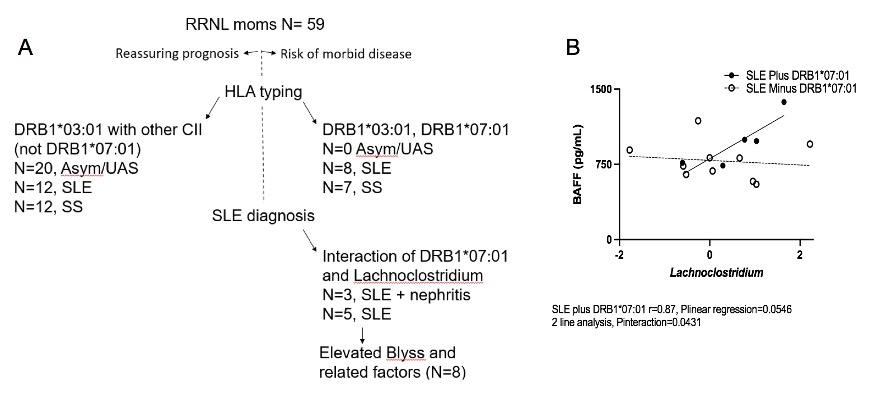Session Information
Session Type: Poster Session B
Session Time: 9:00AM-11:00AM
Background/Purpose: Mothers of children with neonatal lupus (NL) are often clinically asymptomatic or have insufficient criteria for a formal rheumatologic diagnosis, despite having high titers of autoantibodies to Ro60 and 52. That some women never progress, while others transition to SLE or SS, provides a unique opportunity to identify early drivers of disease. Informed by quantifications of cytokine levels in army recruits who develop lupus, TNF superfamily factors are posited to drive progression from benign preclinical to clinical autoimmunity.While many factors have contributed to this model, the gut microbiome and its interplay with HLA haplotypes (class II, in particular) are understudied. Here, we test the specific hypothesis that levels of three cytokines (BAFF, TNFRI, TNFRII) vary as a function of gut Lachnoclostridium abundance and DRB1*07:01 status in anti-Ro+ NL mothers who have progressed to clinical disease.
Methods: Anti-Ro+ NL mothers (n=59) who carried the allele of interest (DRB1*03:01 at HLA, Figure, Panel A) had 16S microbiome sequencing of stool samples. Taxa relative abundances, including that of Lachnoclostridium, were center log ratio (CLR) transformed, hereafter referred to as relative abundance, consistent with the compositional nature of 16 S data.BAFF, TNFRI, and TNFRII were assayed using a validated multiplex bead-based (xMAP) approach in serum from NL mothers with a blood sample drawn near the time of stool specimen collection and who had HLA genotyping.
Results: In addition to carrying DRB1*03:01, the HLA Haplotype also included DRB1*07:01, which was reported in 8/20 NL mothers with SLE and 7/19 NL mothers with SS (Figure, Panel A). Of those with SLE, 4 had lupus nephritis (LN) with 3 carrying DRB1*07:01 while only 5/16 without LN carry DRB1*07:01. In contrast to SLE and SS, DRB1*07:01 was not observed in NL mothers with preclinical disease (0 of 20; asymptomatic/undifferentiated autoimmune syndrome, Asym/UAS). Serologic levels of BAFF, TNFRI, and TNFRII were notable in the NL mothers with SLE versus subjects in the SS and Asym/UAS groups. Specifically, for TNFRI, levels (pg/mL) of 1255, 1265, and 1160 correspond to SLE, SS, and Asym/UAS, respectively.In addition there was an enrichment of SLE with DRB1*07:01 (1321 pg/mL). Lachnoclostridium relative abundance was positively associated with levels of BAFF, TNFRI, and TNFRII in NL mothers who carry DRB1*07:01 but not in those without DRB1*07:01 (with r values of 0.87, 0.79, 0.55, respectively, Figure, Panel B). NL mothers diagnosed with SS (N=19) did not show a parallel trend as that of those diagnosed with SLE.Specifically, those with SS had comparable TNFRI levels within groups that were stratified by DRB1*07:01 haplotype.Lachnoclostridium did not exhibit an association with DRB1*07:01, suggesting a dichotomy of clinical disease for NL mothers.
Conclusion: These results suggest a path to discriminate anti-Ro-positive SLE patients with a reassuring prognosis from those at risk of morbid disease based on the complex interplay between DRB1*07:01 and Lachnoclostridium abundance. Further, NL mothers who are DRB1*07:01 positive may trigger a higher relative abundance of Lachnoclostridium, leading to a cascade of events toward clinical disease.
To cite this abstract in AMA style:
Clancy R, Izmirly C, Marion M, Fraser N, Guthridge J, Howard T, Izmirly P, Masson M, Buyon J, James J, Langefeld C. A Complex Interplay Among Gut Lachnoclostidium, HLA Haplotype DRB1*07:01, and the TNF Superfamily in Anti-Ro+ Women with a Spectrum of Preclinical and Clinical Autoimmunity Whose Children Have Neonatal Lupus [abstract]. Arthritis Rheumatol. 2023; 75 (suppl 9). https://acrabstracts.org/abstract/a-complex-interplay-among-gut-lachnoclostidium-hla-haplotype-drb10701-and-the-tnf-superfamily-in-anti-ro-women-with-a-spectrum-of-preclinical-and-clinical-autoimmunity-whose-children-have-neonata/. Accessed .« Back to ACR Convergence 2023
ACR Meeting Abstracts - https://acrabstracts.org/abstract/a-complex-interplay-among-gut-lachnoclostidium-hla-haplotype-drb10701-and-the-tnf-superfamily-in-anti-ro-women-with-a-spectrum-of-preclinical-and-clinical-autoimmunity-whose-children-have-neonata/

